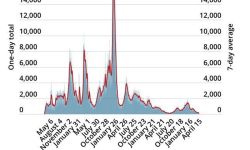Grand Traverse bans vaccine mandates — and wants whole country to know


LANSING—Two months after Michigan ended statewide COVID-19 restrictions, local governments and school boards are grappling with the regulatory burden — and political blowback — as they develop a patchwork response.
Grand Traverse County commissioners on Wednesday adopted a resolution banning vaccine mandates and imposing conditions on public health advertising, while Livingston County commissioners turned down $1.5 million in pandemic funding from the state.
Elsewhere Wednesday, Kalamazoo and Allegan county health departments became the second and third in Michigan to require masks for all K-6 school students, while protesters gathered in the first county to do so — Genesee — demanding local officials reverse the policy.
Related:
- In Michigan, the COVID increase isn’t just among the unvaccinated anymore
- COVID boosters likely coming to Michigan in September. What to know.
- State’s top doc to Whitmer: School mask mandate would reduce COVID in Michigan
- Michigan GOP eyes limits to vaccine, mask rules. Health officials dismayed
Local officials clamored for decision-making power early in the pandemic, and in that regard, "the absence of a state mandate is helpful," Livingston County Administrator Nathan Burd told Bridge Michigan Wednesday.
But, he noted, there are now "tough decisions to be made" at the local level.
Grand Traverse County is the second-most vaccinated county in the state, but anti-vaccine activists flooded a Wednesday morning commission meeting to support a Republican resolution prohibiting mandatory immunization for government employees and discouraging private employers from adopting any policy that would “hinder medical autonomy.”
Adopted by the GOP majority in a 5-1 vote, the resolution also sought to undermine potential mask mandates by prohibiting the county from questioning “any citizen’s claim to exemption from wearing a facemask or any other similarly mandated preventive activity."
And moving forward, according to the resolution, the Grand Traverse County Health Department will be required to include a disclaimer on any materials referencing vaccinations, directing residents to "discuss the risks and benefits" with a trusted healthcare professional.
"It isn't muzzling their message," Chair Rob Hentschel, who sponsored the resolution, argued before the commission vote.
"We're not telling the health department it can't do its job. They can still promote vaccines and all that stuff, but I want to encourage people — just like every other pharmaceutical commercial we see on television — to talk to their personal doctor."
The resolution, believed to be the first local level vaccine mandate ban of its kind in Michigan, directs county staff to send copies of the adopted language to all 3,005 other counties in the United States, which critics called evidence the Republican proposal was intended primarily as a political statement.
That “hubris” could have negative consequences for public health and the image of Grand Traverse County, argued Betsy Coffia, one of two Democrats on the commission and the only one present for the Wednesday morning vote.
"We are, as a political body, inserting ourselves into the public health sphere," Coffia said. "Without expertise, we are telling the health department what they shall and shall not do."
An official from Munson Healthcare, the county's largest medical provider, told Coffia and other commissioners in an email that the hospital system opposes the resolution because doctors "do not believe it is helpful in efforts to increase the overall vaccination rate in northern Michigan."
Nearly 75 percent of Grand Traverse County residents over the age of 16 have already received at least one shot of a COVID-19 vaccine, which is significantly higher than the statewide average of 65 percent
The county of 94,000 residents reported 21 new cases of COVID-19 on Wednesday, up from the nine cases per day it averaged over the past week. The U.S. Centers for Disease Control and Prevention considers the county at “substantial” risk for transmission.
Vaccination foes dominated the public comment section of Wednesday's meeting, sharing a string of questionable statistics about innoculation side effects (which do happen but are very rare) and promoting personal liberty over community health.
"I, for one, would rather die from COVID than live under fear," said Beverly Lewis of neighboring Leelanau County, which has the highest vaccination rate in the state with 79 percent of residents receiving at least one COVID vaccine dose.
Grand Traverse County was not planning a vaccine mandate system for government employees, and an attorney for the county told commissioners it is not clear how much authority the state constitution gives them to regulate health.
Regardless, a local health department official said the resolution is unlikely to significantly disrupt COVID mitigation efforts in Grand Traverse County.
“We acknowledge that we're going to have to adjust some messaging,” but “we don't believe that this limits our capability or our duty to the community in any way,” said Mike Lahey, the county health department's emergency preparedness director.
In Livingston County, meanwhile, conservative commissioners on Wednesday rejected a motion to accept more than $1.5 million in pandemic response funding from the state, including $900,000 for immunization efforts.
Chairman Wes Nakagiri, who voted against the funding, told Bridge he was concerned that much of the money would be directed toward inoculating younger residents who are less likely to get seriously ill if they contract COVID-19.
Overall, about 65 percent of Livingston County residents have received at least 1 dose of a COVID-19 vaccine, which is right around the state average but below Gov. Gretchen Whitmer’s goal of 70 percent.
Nakagiri noted the local vaccination rate is higher — roughly 80 percent — for adults over the age of 65 who are more vulnerable.
"I think that money can be better used in areas” with lower vaccination rates, Nakagiri said. "I didn't see it as needed (in Livingston County). I guess that's the bottom line."
It's rare for a local government to turn down state or federal funding, but Nakagiri noted "some taxpayer paid that money."
The vote cuts off a source of funding that has helped Livingston’s health department bring on additional staffers to respond to COVID-19 and offer vaccination clinics, said Burd, the Livingston County administrator who is not on the commission and was not part of Wednesday’s vote.
Without the pandemic aid, "we're going to have to look at what our options are for funding to continue our COVID-19 response," he said. "We were hopeful that it would be renewed."
Nakagiri said he and other Republicans who rejected the COVID-19 funding were also concerned that one allowable use included "violation monitoring" by the county health department.
But there are no state-level restrictions to enforce right now, and the county "has never issued a mandate of any kind related to any sort of restriction since the pandemic began, so there's nothing to trigger a violation right now," Burd said.
Health officials in Kalamazoo and Allegan counties on Wednesday cited rising COVID case counts and the aggressive delta variant as they issued new orders requiring K-6 students to wear masks in schools this fall, a step the state and CDC have recommended but not required.
The new local orders also require teachers and other school staff to wear masks indoors.
"Achieving high levels of COVID-19 vaccination among eligible students, as well as teachers, staff and household members is the most critical strategy to help schools stay open safely," the Kalamazoo and Allegan County health departments said in a joint statement.
"Students younger than 12 years of age are currently ineligible to receive the vaccination. Therefore, the best protection strategy against COVID-19 that is available to this population are face masks.”
See what new members are saying about why they donated to Bridge Michigan:
- “In order for this information to be accurate and unbiased it must be underwritten by its readers, not by special interests.” - Larry S.
- “Not many other media sources report on the topics Bridge does.” - Susan B.
- “Your journalism is outstanding and rare these days.” - Mark S.
If you want to ensure the future of nonpartisan, nonprofit Michigan journalism, please become a member today. You, too, will be asked why you donated and maybe we'll feature your quote next time!


